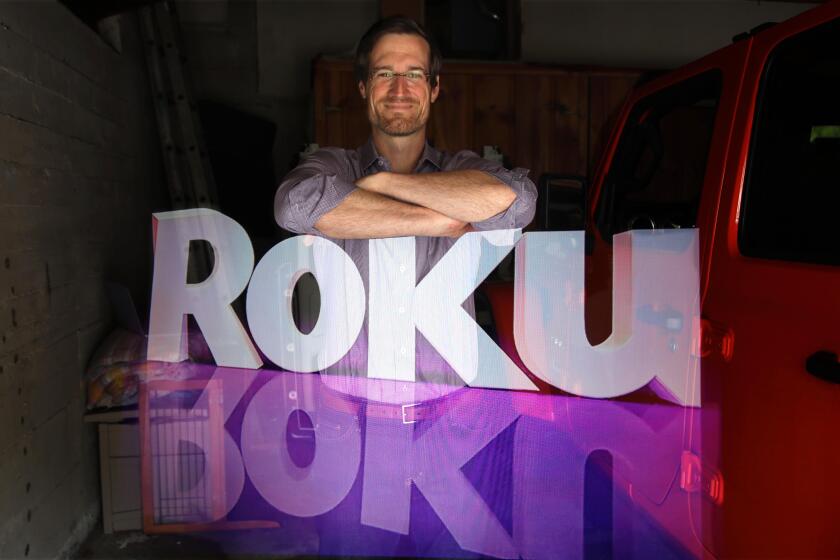Quibi died, but its shows will live on with Roku
The final chapter for defunct streaming service Quibi is coming to an end.
The Hollywood company, which shut down in December, sold the global distribution rights to more than 75 shows and documentaries to San Jose streaming platform Roku.
Financial terms of the deal were not disclosed. But a person familiar with the deal who was not authorized to comment said the rights were sold for less than $100 million.
The programs, which include Emmy-winning drama “#FreeRayshawn” and the Kevin Hart comedy “Die Hart,” will live on Roku’s free, ad-supported streaming service, the Roku Channel, later this year, the company announced Friday.
“We think this will be a success for Roku because of Roku’s scale,” Rob Holmes, vice president of programming, said in an interview. “This kind of new original content — you just don’t get it for free in streaming typically. It’s quality TV content.”
Founded in 2002, Roku makes money through advertising, licensing its technology and selling connected-TV hardware. It also collects a cut of the subscriptions sold on its platform.
The company has long positioned itself as a one-stop hub for customers where they can access a variety of streaming platforms such as Netflix, Disney+ or HBO Max through Roku.
For Roku, Quibi’s content could be especially valuable because it features well-known celebrities. Hollywood also is hungry for new content because the COVID-19 pandemic has canceled or delayed new production. And the programming can help set Roku apart from its bigger rivals, which include the tech giants Apple and Amazon.
“If you’re going to be in that game in any manner, shape or form, content is still king,” said Maribel Lopez, founder of Lopez Research in Mount Pleasant, S.C. “Quibi had a lot of original content that they had spent a lot of money on, so this gives Roku an opportunity to have content.”
The sale provides relief and an opportunity for many creators who built shows for Quibi and were dismayed when the streaming service suddenly went dark.
Quibi’s decision to shut down the company is forcing more than 200 employees out of work.
“Honestly, I would be stoked for it to be available anywhere,” said Cody Heller, creator of “Dummy,” a Quibi comedy starring Anna Kendrick. “I still am very proud of the show and would love more people to see it, so Roku sounds very exciting to me.”
Quibi aimed to become the next generation of storytelling by creating premium content intended to be viewed on mobile phones.
Led by Jeffrey Katzenberg and Meg Whitman, the company raised $1.75 billion, spending up to $100,000 a minute on programs. It attracted Academy Award-winning directors such as Steven Spielberg and A-list actors including John Travolta to take part in its projects, but Quibi faced insurmountable challenges.
The service targeted millennials on the go with episodes no longer than 10 minutes. But the pandemic forced the company to pivot.
Additionally, the Quibi app initially was not available for TV viewing and did not have enough hit shows to attract a big enough audience willing to pay for the service.
Roku’s fortunes have brightened considerably since the COVID-19 pandemic halted production in Hollywood and confined people to their homes.
Still, some shows that never got a chance to succeed could get a new life on the Roku Channel, which has the scale that Quibi lacked, reaching 61.8 million people in the U.S. The Roku Channel has more than 40,000 free movies and programs and 150 free live linear channels.
The Quibi shows will appear in their short-form format, with each episode followed by advertising, Holmes said.
“The shows with Anna Kendrick, Chrissy Teigen, Chris Hemsworth and big stars are going to do well because you can put their face in a thumbnail,” said Evan Shapiro, a producer and former executive at NBCUniversal who sold a non-scripted series to Quibi that never got made. “If you’re already on Roku, and you’re getting the content for free … why not give it a try?”
Inside the business of entertainment
The Wide Shot brings you news, analysis and insights on everything from streaming wars to production — and what it all means for the future.
You may occasionally receive promotional content from the Los Angeles Times.
A dozen new shows developed for Quibi that were never shown on the app will also make their debut on the Roku Channel, including the Farrelly Brothers comedy “The Now.”
“The most creative and imaginative minds in Hollywood created groundbreaking content for Quibi that exceeded our expectations,” Katzenberg said in a statement. “We are thrilled that these stories, from the surreal to the sublime, have found a new home on the Roku Channel.”
The unique licensing agreements Quibi had with creators, however, could complicate Roku’s plans for the shows. Under those deals, creators were given the rights to their shows after seven years and could shop longer versions of their shows to other platforms after two years on Quibi. And some who created shows specifically for Quibi may not want to see their content on a free streaming platform like the Roku Channel.
Roku has not funded original productions, but the Quibi deal could potentially open the door to that in the future.
“It does create some opportunities to have discussions with folks who have made shows for Quibi or have shows in the process,” Holmes said. “This isn’t the start of some big push into original production. I think it will be sort of opportunistic, and fundamentally this is an ad-supported business.”
Roku has seen a surge in viewership during the pandemic as people looked for ways to entertain themselves at home. Viewers spent 17 billion hours streaming on Roku in the fourth quarter, up 55% from a year earlier, the company said.
Roku stock was trading at $399.13 a share at market close Friday, up 5.2%.
Investment firm and merchant bank LionTree was the sole advisor to Quibi on the sale.
More to Read
Inside the business of entertainment
The Wide Shot brings you news, analysis and insights on everything from streaming wars to production — and what it all means for the future.
You may occasionally receive promotional content from the Los Angeles Times.












